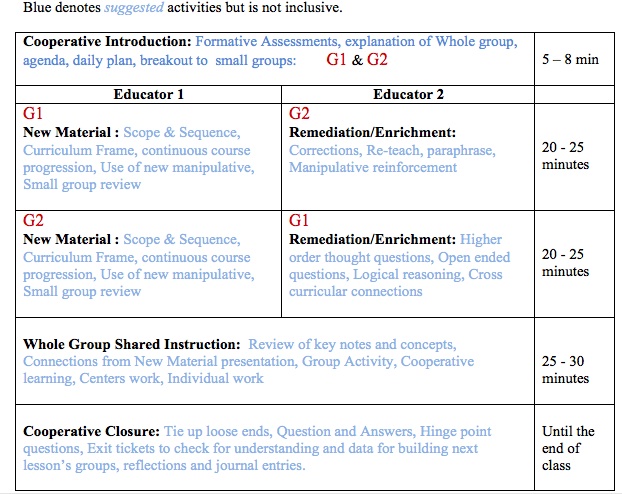Picture a harried General Education teacher with a subordinate aide sitting placidly in the back waiting to be told what to do. Despite repeated attempts to define and redefine the roles of each “teacher,” in the traditional inclusion class we continually get the “one teacher, one aide” relationship. That’s a far cry from the expectation of two qualified and skillful educators working seamlessly within one class to meet the demands and needs of each child while challenging the group as a whole. It really doesn’t matter whether it’s by design or happenstance, but the traditional representation of an inclusion class is not an example of the best use of our resources.
In terms of man-hours, with two professionals in the 90-minute class, 180 man-minutes are employed. With one person teaching and the other passive, only 90 of 180 instruction minutes are accounted for (a 50% efficiency rate). With the model explained below, there are well over 150 accountable minutes of direct instruction or 83% efficiency.
The inclusion model below is an adaptation of one used by successful inclusion teams in the schools where I have worked. Within this particular frame, the General Educator and Special Educator will, however, need ample time to discuss and plan each lesson. Therefore, it is recommended that all Inclusion teams have at least one common planning period.
Each teacher is responsible for two plans: Instructor “A” is responsible for the New Material and Whole Group Instruction and Instructor “B” is responsible for the Remediation and Enrichment Instruction.
Do you think this model would be successful in our schools as well?
Inclusion Class Lesson Format Model
Inclusion Components
- Planning
This is clearly the most critical component of a successful program. Suggestions to Administrators:
- Common Planning for the Inclusion Team
- A maximum of two General Educators per Special Educator
- A maximum of two different curricula
- Professional Development time
- Small Group decisions
Groups are determined by Current Level of Performance as determined by:
- Formative Data
- The data from the most recent assessment that reflects the Essential Knowledge as outlined by the Curriculum Framework.
- Hinge point questions from the previous Closure.
- Observation from previous lesson
- Pre-test data
- Post Test data
- More importantly than “How” groups are determined is “Why” and “When” small groups are needed.
- Remediation
Data driven from most recent Assessments
- Enrichment
Provides a deeper and broader understanding of material
- Whole Group Instruction
Whole group instruction suggestions:
- Co-Planned
- Cooperatively executed
- Cooperatively facilitated
By, Ric Gauriloff, Consultant
